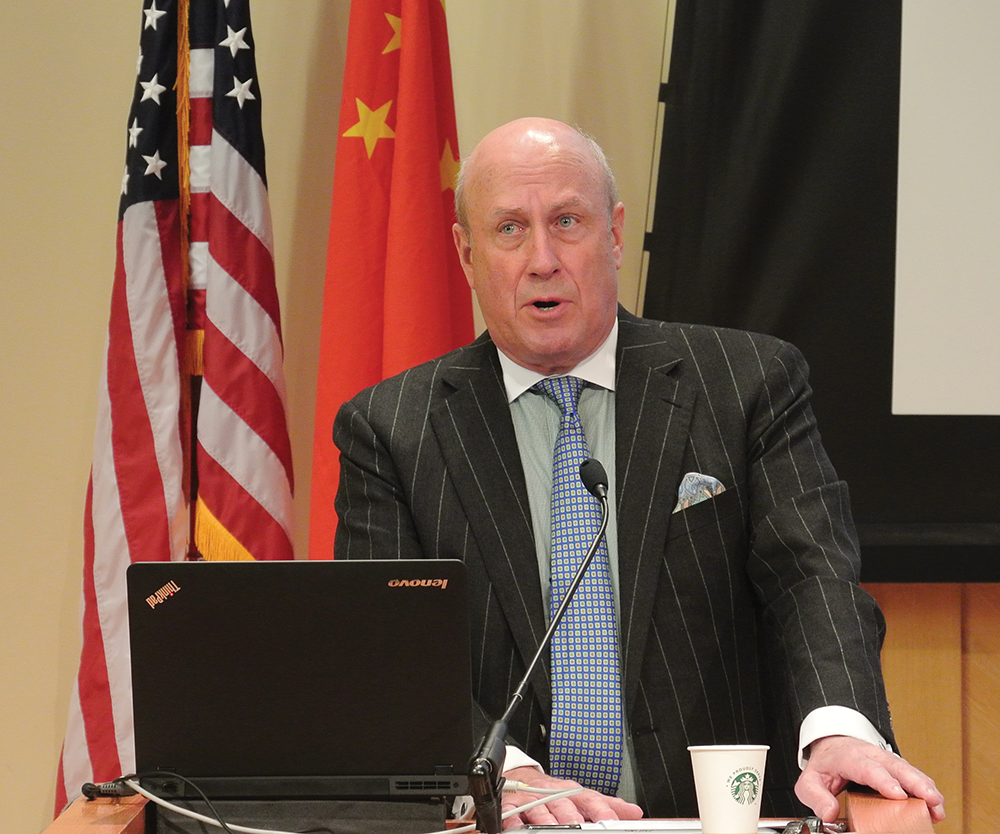
Douglas H. Paal, vice president for studies at the CEIP,
delivers the keynote speech Friday in Lohrfink Auditorium.
The second annual China-U.S. Forum, co-hosted by the Georgetown University Chinese Students and Scholars Association and the School of Foreign Service Asian Studies Program, involved discussions on changes to economic and global governance patterns Friday in Lohrfink Auditorium.
CSSA Chair Miaomiao Shao (GRD ’16) emphasized the importance of examining the relations between China and the United States.
“The goal of the forum is to provide a unique platform for policymakers, business leaders, scholars [and] students to discuss current issues regarding China-U.S. relations in the area of economic, political and cultural cooperation,” Shao said. “We are so lucky to have so many distinguished speakers with us here today.”
Victor Cha, the director of the SFS Asian Studies Program, served as the moderator for the event. Cha introduced David Dollar, a senior fellow with the Foreign Policy and Global Economy and Development programs at the Brookings Institute. Dollar is a preeminent scholar on China’s economy and relations with the United States.
Dollar’s opening talk focused on China’s growth model. He expressed a desire that that the model will contribute to a strong foundation for China-U.S. economic relations.
“China’s obviously had a very long and successful period of economic growth. It’s grown at an average rate above 10 percent for three decades,” Dollar said.
Dollar drew connections to his previous experiences overseeing economic development in Japan and South Korea, countries that both share a similar growth model to China. Although there were commonalities between the three economically successful Asian nations, Dollar did note that certain parts of the Chinese experience are unprecedented: high levels of investment have been critical to the Chinese economy, more so than the technological growth that provided the surge for Japanese and South Korean sectors.
Dollar tempered his report of China’s unprecedented growth, warning that the economic model for China is also unsustainable.
“When you are so dependent on capital accumulation, you end up seeing diminishing returns to capital,” Dollar said. “The model is running out of steam. Investment is still going up, but growth is slowing down. It’s taking more and more investment to grow at slower and slower rates.”
While Dollar noted that the growth model had been successful in poverty reduction, the negative environmental externalities and the unsustainability of the system remain major flaws in need of reform.
He identified four specific features of the Chinese fiscal growth system that need reform in order to free China’s economic sector: the household registration system, financial repression, a large state enterprise sector and the one-party system.
Dollar affirmed current legislation promised by the Chinese government — such as opening up the economy to foreign investment — as positive actions if implemented.
After Dollar’s presentation, three panels were introduced to fill out the remainder of the seven-hour event. The first panel was focused on new trends in global economic patterns and China-U.S. cooperation. The second panel dealt with China-U.S. relations as a whole, including cultural and military aspects. The final panel helped develop the issue of social welfare and development in China.
There were over 50 people in attendance at the event, though attendees migrated in and out of the seven-hour forum. Despite minimal attendance from undergraduates, graduate students, primarily from the McCourt School of Public Policy, largely populated the event.
Students pointed to the opportunity to see experts from other schools as a highlight of the event. Claire Peng (GRD ’17) also appreciated the interaction and debates between the different professors at the forum.
“Most people would think economic growth results in more pollution, but [the professors] kind of disagreed with each other. There were a lot of debates, but it’s very interesting to see how they get their conclusions,” Peng said.














